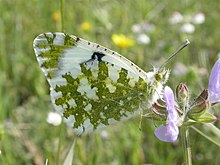| Euchloe | |
|---|---|
 | |
| Western dappled white (Euchloe crameri) | |
 | |
| Eastern greenish black-tip (Euchloe penia) | |
| Scientific classification | |
| Domain: | Eukaryota |
| Kingdom: | Animalia |
| Phylum: | Arthropoda |
| Class: | Insecta |
| Order: | Lepidoptera |
| Family: | Pieridae |
| Tribe: | Anthocharini |
| Genus: | Euchloe Hübner, [1819] |
| Species | |
Several, see text | |
| Synonyms | |
| |
Euchloe is a genus of pierid butterflies from the orangetip tribe (Anthocharini). They are Holarctic in distribution, with most species in Europe, Central Asia, and North America. Like other Anthocharini, the American species are usually called marbles; the Old World species are known as dappled whites.